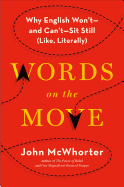
Columbia University professor and linguist John McWhorter (The Language Hoax and Our Magnificent Bastard Tongue) has crafted an entertaining spin on the history of the English language as living, breathing and organic in Words on the Move: Why English Won't--and Can't--Sit Still (Like, Literally). Providing insight through surprising examples, he describes changes in both the language and its speakers, such as how speakers interpret and personalize language, how social forces shape semantics and how evolution in pronunciation affects word meaning. Back in Shakespeare's time, the word awful had the complimentary meaning of "full of awe"; over the centuries, this word took on a negative quality, and awful was eventually replaced with today's positive awesome. Similarly, the word reduce, which had the meaning of "go back" in the 17th century, acquired the meaning of "minimization" or "destruction" in the very next century.
McWhorter demonstrates how people have put their own stamp on languages through vowel shifts (Detroiters' jabs for jobs). He also shows how emphasis on a particular syllable can change the function of a word, a process called backshift (the noun blackboard versus black board--a board that is black in color). To those who claim that change deteriorates pure language, McWhorter argues that such sentiments are "fostered by a combination of bourgeois sensibility and the dominance of unchanging documents." In other words, language change will always happen. It's simply a matter of when.
"Words are not handed down on tablets and locked into place," writes McWhorter. "They are squirted out of a tube to float around." --Nancy Powell, freelance writer and technical consultant

